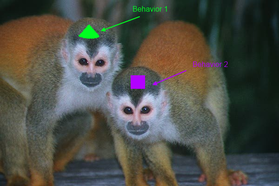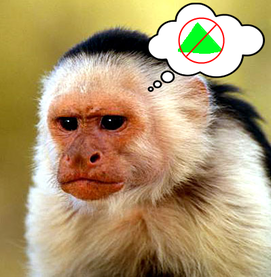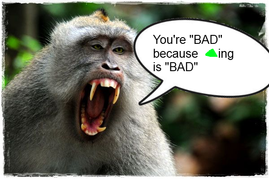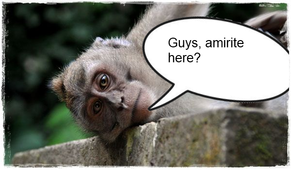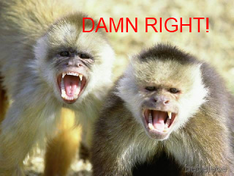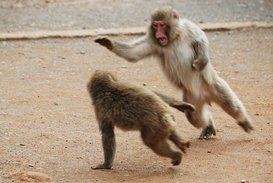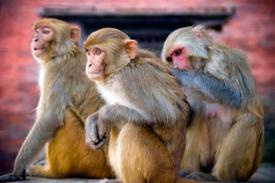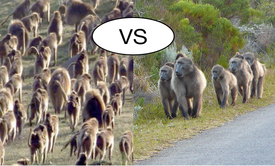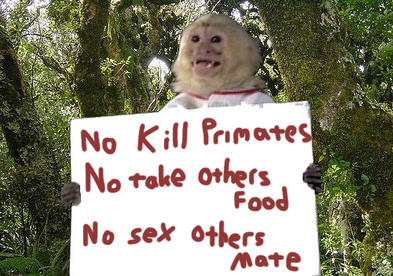Morality in One Lesson
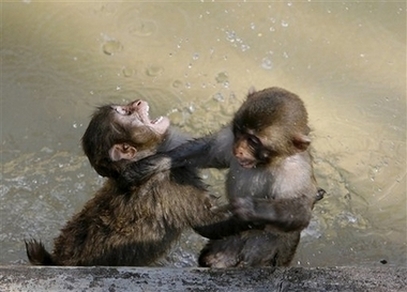
I'm going to taboo common moral terms for this post. Frankly, moral terms are highly confused and self-referential. It's common practice to use established terms in the way that everyone else uses them, lest the mind revert easily and you get misunderstood or, heaven forbid, you don't get referenced in journals. But I can't abide people using definitions in a wobbly manner. That is, terms are defined to be about something, but that something cannot be pinned down upon closer examination.
Well, I'm bucking the trend in this case because I want the words to be redefined to something which actually exists but which still carries a lot of the established mental associations. I want to do this as a not-so-covert attempt to convert people to a new way of thinking about morality, and the whole sphere of ought.
These two primates appear to be attempting to resolve a conflict in a way that primates seem wired to do: violence. The violence itself isn't important for a consideration of the fundamentals of morality; conflict and resolution are what's important. Let's start off with a simple list of assertions and see if any of them fail dramatically.
So, here goes morality in one lesson. As a nod to our forebears I'll be using primates in these examples (and, yes, I know that modern non-human primates are our cousins not our forebears). Monkeys are hilarious when they're not serious business.
Well, I'm bucking the trend in this case because I want the words to be redefined to something which actually exists but which still carries a lot of the established mental associations. I want to do this as a not-so-covert attempt to convert people to a new way of thinking about morality, and the whole sphere of ought.
These two primates appear to be attempting to resolve a conflict in a way that primates seem wired to do: violence. The violence itself isn't important for a consideration of the fundamentals of morality; conflict and resolution are what's important. Let's start off with a simple list of assertions and see if any of them fail dramatically.
So, here goes morality in one lesson. As a nod to our forebears I'll be using primates in these examples (and, yes, I know that modern non-human primates are our cousins not our forebears). Monkeys are hilarious when they're not serious business.
|
One: Some creatures live in proximity with one another and, for the most part, enjoy the company and services of those others. These creatures can communicate with one another via spoken or other forms of language or by posturing or aggression. These creatures have their own like and dislikes. Some of these likes and dislikes are genetic proclivities, some are learned. Some are weak proclivities, some are strong.
|
Three: They use certain terms or expressions to indicate their disapproval of the creatures' actions. They share these terms or expressions to get the support of other creatures.
Four: These creatures can then attempt to get the ones they're disapproving of to change by directing efforts toward those creatures. They can physically prevent certain actions by those creatures or they can use real or threatened measures against those creatures such that the creature wants to avoid the measures more than they want to do or not do the thing being disapproved of.
Six: To get more creatures behind any given set of likes, general rules and goals can be teased out of a group and taught and written. General rules are easier to learn, disseminate, and practice than complicated rules.
Seven: From these general rules, the actions of creatures can be tested by proxy to see if is to be liked or disliked.
Now, other than the fact that the type of monkey pictured kept changing due to a lack of good available freeish pictures, what's wrong with the above outline? It's overly simplistic? Why does it have to be more complex than that. Complex rules and structure emerge out of very simple ones all the time.
I feel like I've earned the ability to slightly change some moral terms...
Morality - the practice described above of expressing likes and dislikes and formulating a way to communicate such, building alliances to promote ends, establishing rules from goals, examining rules relative to goals, extracting the fundamental goals from common rules, etc. I like to say that morality is to ought as science is to is. Morality is a practice, but also a natural phenomenon among certain social creatures. There are no "moralities" - just like you can't have two sciences or five cookings. Morality is a process - a moral ecosystem which produces moral systems and moral rules.
Moral System - A system which promotes certain ends, uses a certain paradigms and axioms to create rules, and a system of rules as prescriptions and proscriptions. A moral system can be well known or almost unknown, and it can have many adherents, one adherent, or no adherents. Moral systems are the product of morality.
Moral Rule - A prescription or proscription defined in a moral system. Moral rules are the product of moral systems or can be "unaffiliated" and relate directly to desires.
Ethics - the philosophy and study of morality.
Moral - when people say "that's moral" or "that's immoral" it now must mean "accordant or discordant with moral system X or desire Y" or it's nonsense. While many people will actual attempt to state "correct or incorrect in itself or in all systems" this statement has no natural underpinning and is either flat out false in the first usage or almost certainly false in the second usage.
If you're ready to see the fallout of this view of morality, click here.
I feel like I've earned the ability to slightly change some moral terms...
Morality - the practice described above of expressing likes and dislikes and formulating a way to communicate such, building alliances to promote ends, establishing rules from goals, examining rules relative to goals, extracting the fundamental goals from common rules, etc. I like to say that morality is to ought as science is to is. Morality is a practice, but also a natural phenomenon among certain social creatures. There are no "moralities" - just like you can't have two sciences or five cookings. Morality is a process - a moral ecosystem which produces moral systems and moral rules.
Moral System - A system which promotes certain ends, uses a certain paradigms and axioms to create rules, and a system of rules as prescriptions and proscriptions. A moral system can be well known or almost unknown, and it can have many adherents, one adherent, or no adherents. Moral systems are the product of morality.
Moral Rule - A prescription or proscription defined in a moral system. Moral rules are the product of moral systems or can be "unaffiliated" and relate directly to desires.
Ethics - the philosophy and study of morality.
Moral - when people say "that's moral" or "that's immoral" it now must mean "accordant or discordant with moral system X or desire Y" or it's nonsense. While many people will actual attempt to state "correct or incorrect in itself or in all systems" this statement has no natural underpinning and is either flat out false in the first usage or almost certainly false in the second usage.
If you're ready to see the fallout of this view of morality, click here.
